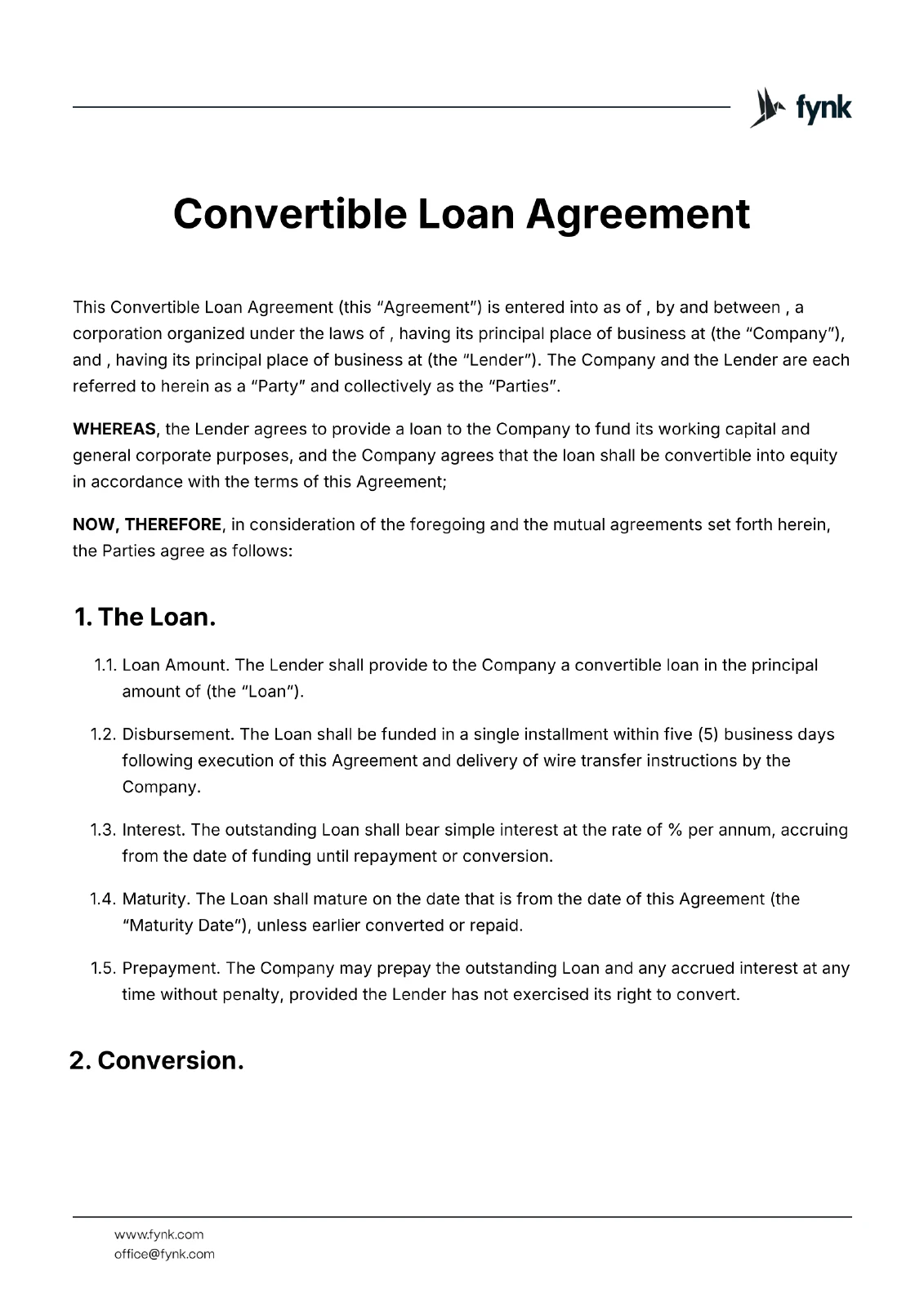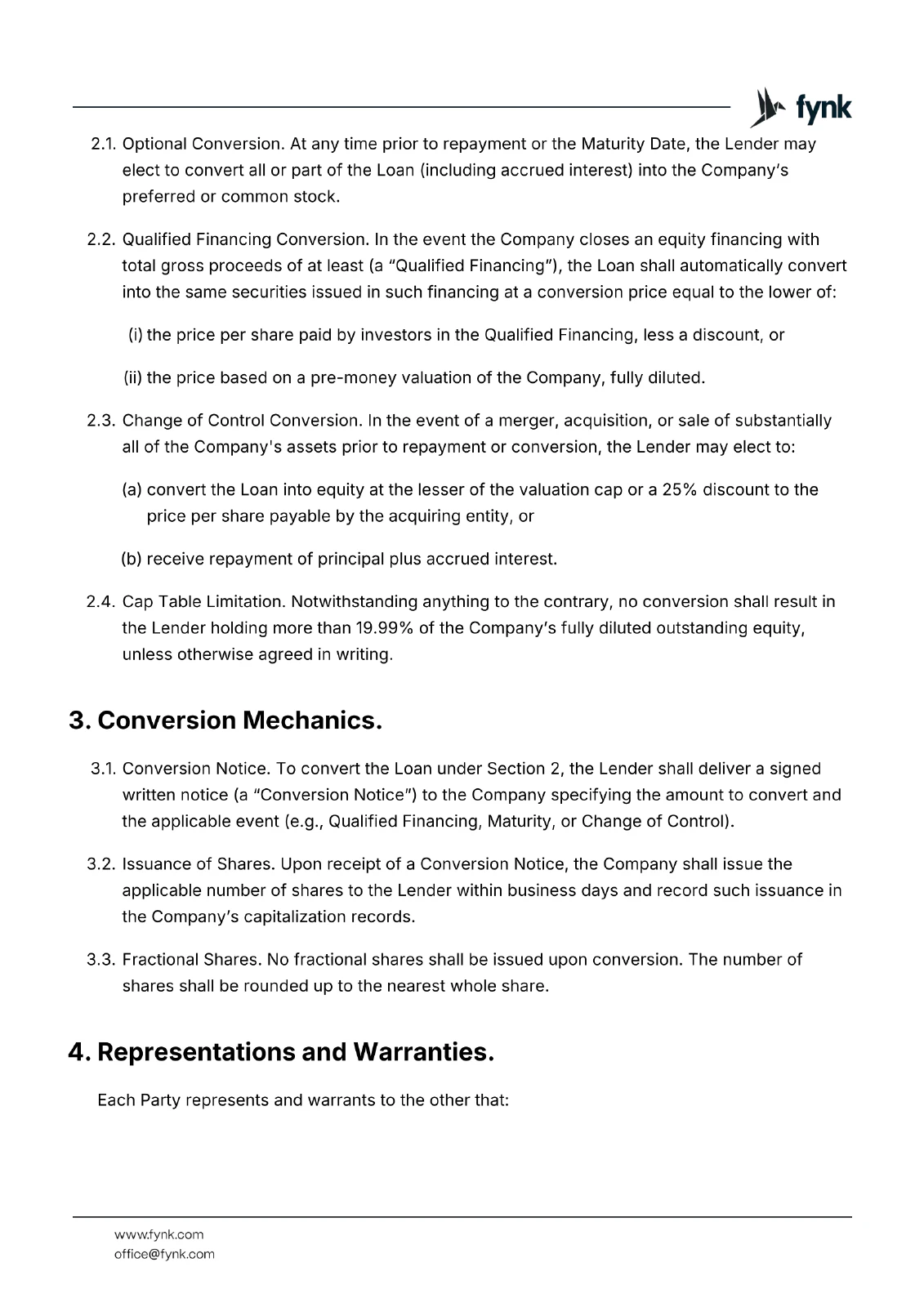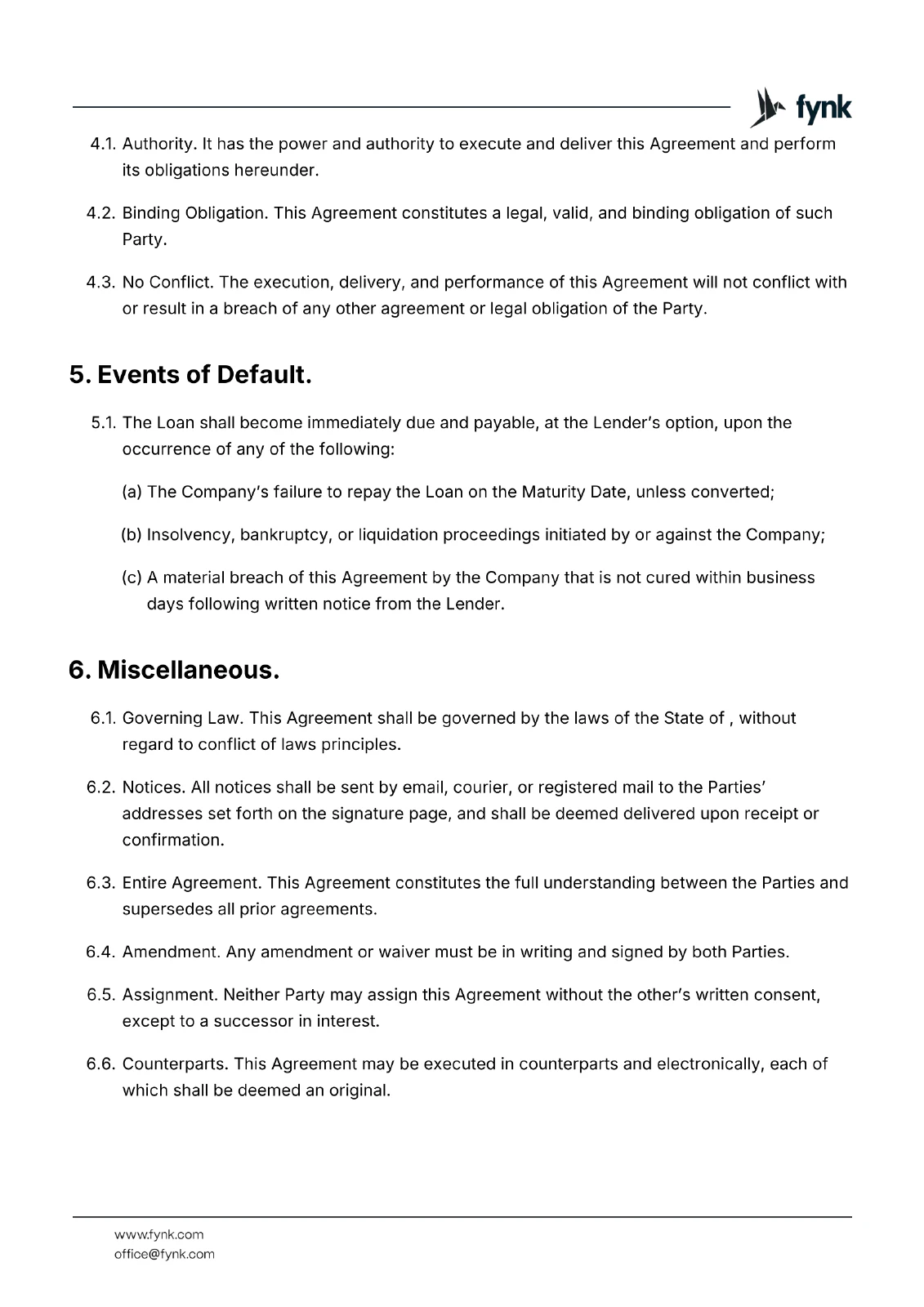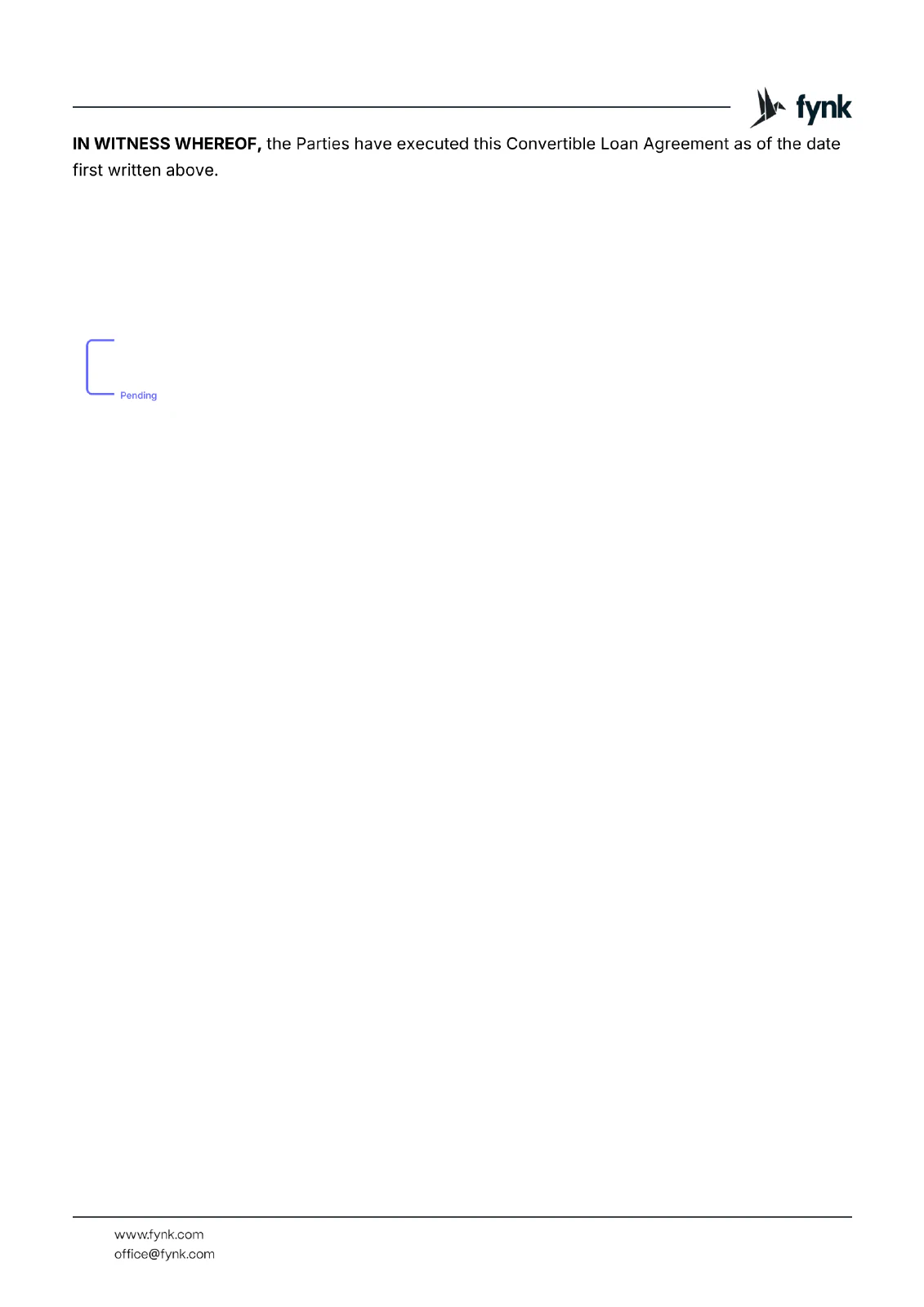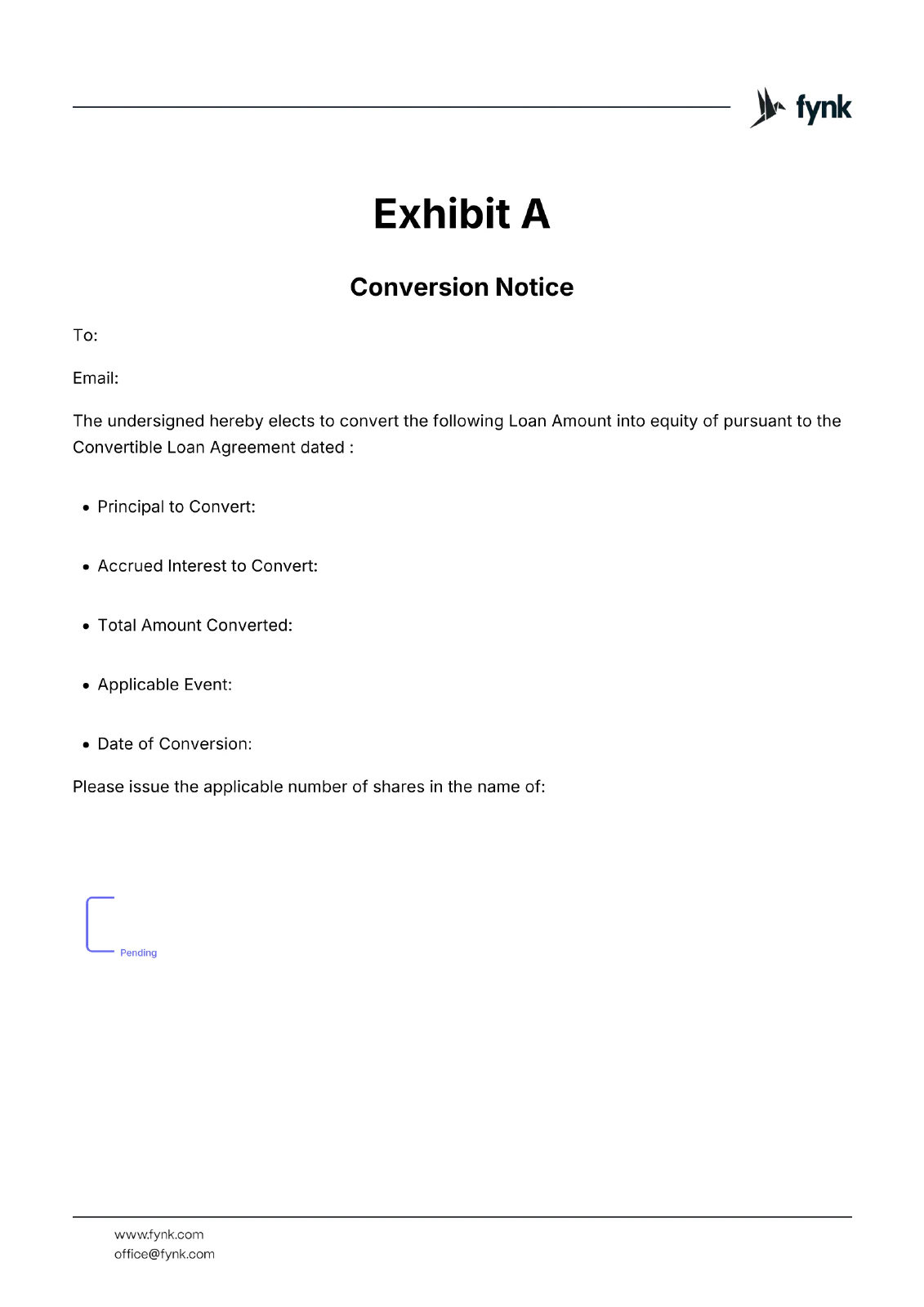Convertible Loan Agreement
This Convertible Loan Agreement (this “Agreement”) is entered into as of , by and between , a corporation organized under the laws of , having its principal place of business at (the “Company”), and , having its principal place of business at (the “Lender”). The Company and the Lender are each referred to herein as a “Party” and collectively as the “Parties”.
WHEREAS, the Lender agrees to provide a loan to the Company to fund its working capital and general corporate purposes, and the Company agrees that the loan shall be convertible into equity in accordance with the terms of this Agreement;
NOW, THEREFORE, in consideration of the foregoing and the mutual agreements set forth herein, the Parties agree as follows:
The Loan.
Loan Amount. The Lender shall provide to the Company a convertible loan in the principal amount of (the “Loan”).
Disbursement. The Loan shall be funded in a single installment within five (5) business days following execution of this Agreement and delivery of wire transfer instructions by the Company.
Interest. The outstanding Loan shall bear simple interest at the rate of % per annum, accruing from the date of funding until repayment or conversion.
Maturity. The Loan shall mature on the date that is from the date of this Agreement (the “Maturity Date”), unless earlier converted or repaid.
Prepayment. The Company may prepay the outstanding Loan and any accrued interest at any time without penalty, provided the Lender has not exercised its right to convert.
Conversion.
Optional Conversion. At any time prior to repayment or the Maturity Date, the Lender may elect to convert all or part of the Loan (including accrued interest) into the Company’s preferred or common stock.
Qualified Financing Conversion. In the event the Company closes an equity financing with total gross proceeds of at least (a “Qualified Financing”), the Loan shall automatically convert into the same securities issued in such financing at a conversion price equal to the lower of:
the price per share paid by investors in the Qualified Financing, less a discount, or
the price based on a pre-money valuation of the Company, fully diluted.
Change of Control Conversion. In the event of a merger, acquisition, or sale of substantially all of the Company's assets prior to repayment or conversion, the Lender may elect to:
convert the Loan into equity at the lesser of the valuation cap or a 25% discount to the price per share payable by the acquiring entity, or
receive repayment of principal plus accrued interest.
Cap Table Limitation. Notwithstanding anything to the contrary, no conversion shall result in the Lender holding more than 19.99% of the Company’s fully diluted outstanding equity, unless otherwise agreed in writing.
Conversion Mechanics.
Conversion Notice. To convert the Loan under Section 2, the Lender shall deliver a signed written notice (a “Conversion Notice”) to the Company specifying the amount to convert and the applicable event (e.g., Qualified Financing, Maturity, or Change of Control).
Issuance of Shares. Upon receipt of a Conversion Notice, the Company shall issue the applicable number of shares to the Lender within business days and record such issuance in the Company’s capitalization records.
Fractional Shares. No fractional shares shall be issued upon conversion. The number of shares shall be rounded up to the nearest whole share.
Representations and Warranties.
Each Party represents and warrants to the other that:
Authority. It has the power and authority to execute and deliver this Agreement and perform its obligations hereunder.
Binding Obligation. This Agreement constitutes a legal, valid, and binding obligation of such Party.
No Conflict. The execution, delivery, and performance of this Agreement will not conflict with or result in a breach of any other agreement or legal obligation of the Party.
Events of Default.
The Loan shall become immediately due and payable, at the Lender’s option, upon the occurrence of any of the following:
The Company’s failure to repay the Loan on the Maturity Date, unless converted;
Insolvency, bankruptcy, or liquidation proceedings initiated by or against the Company;
A material breach of this Agreement by the Company that is not cured within business days following written notice from the Lender.
Miscellaneous.
Governing Law. This Agreement shall be governed by the laws of the State of , without regard to conflict of laws principles.
Notices. All notices shall be sent by email, courier, or registered mail to the Parties’ addresses set forth on the signature page, and shall be deemed delivered upon receipt or confirmation.
Entire Agreement. This Agreement constitutes the full understanding between the Parties and supersedes all prior agreements.
Amendment. Any amendment or waiver must be in writing and signed by both Parties.
Assignment. Neither Party may assign this Agreement without the other’s written consent, except to a successor in interest.
Counterparts. This Agreement may be executed in counterparts and electronically, each of which shall be deemed an original.
IN WITNESS WHEREOF, the Parties have executed this Convertible Loan Agreement as of the date first written above.
Exhibit A
Conversion Notice
To:
Email:
The undersigned hereby elects to convert the following Loan Amount into equity of pursuant to the Convertible Loan Agreement dated :
Principal to Convert:
Accrued Interest to Convert:
Total Amount Converted:
Applicable Event:
Date of Conversion:
Please issue the applicable number of shares in the name of:

